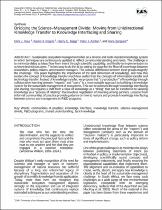 ResearchSpace
ResearchSpace
Bridging the science-management divide: moving from unidirectional knowledge transfer to knowledge interfacing and sharing
JavaScript is disabled for your browser. Some features of this site may not work without it.
- ResearchSpace
- →
- Research Publications/Outputs
- →
- Journal Articles
- →
- View Item
| dc.contributor.author |
Roux, DJ

|
|
| dc.contributor.author |
Rogers, KH

|
|
| dc.contributor.author |
Biggs, H

|
|
| dc.contributor.author |
Ashton, PJ

|
|
| dc.contributor.author |
Sergeant, A

|
|
| dc.date.accessioned | 2007-07-04T07:25:16Z | |
| dc.date.available | 2007-07-04T07:25:16Z | |
| dc.date.issued | 2006-06 | |
| dc.identifier.citation | Roux, DJ, Rogers, KH, Biggs, H, Ashton, PJ and Sergeant, A. 2006. Bridging the science-management divide: moving from unidirectional knowledge transfer to knowledge interfacing and sharing. Ecology and Society, Vol. 11(1), pp 23 | en |
| dc.identifier.issn | 1708-3087 | |
| dc.identifier.uri | http://hdl.handle.net/10204/953 | |
| dc.description | http://www.ecologyandsociety.org/vol11/iss1/art4/ | en |
| dc.description.abstract | Sustainable ecosystem management relies on a diverse and multi-faceted knowledge system in which techniques are continuously updated to reflect current understanding and needs. The challenge is to minimize delay as ideas flow from intent through scientific capability and finally to implementation to achieve desired outcomes. The best way to do this is by setting the stage for the flow of knowledge between researchers, policy makers and resource managers. The cultural differences between these groups magnify the challenge. This paper highlights the importance of the tacit dimension of knowledge and how this renders the concept of knowledge transfer much less useful than the concepts of information transfer and technology transfer. Instead of knowledge transfer, we propose that "co-production" of knowledge through collaborative learning between "experts" and "users" is a more suitable approach to building a knowledge system for the sustainable management of ecosystems. This can be achieved through knowledge interfacing and sharing, which requires a shift from a view of knowledge as a "thing" that can be transferred to viewing knowledge as a "process of relating" that involves negotiation of meaning among partners. Lessons from informal communities of practice provide guidance of how to nurture and promote knowledge interfacing between science and management of Research and Development programmes. | en |
| dc.language.iso | en | en |
| dc.publisher | Resilience Alliance | en |
| dc.subject | Knowledge transfer | en |
| dc.subject | Sciences | en |
| dc.subject | Knowledge management | en |
| dc.title | Bridging the science-management divide: moving from unidirectional knowledge transfer to knowledge interfacing and sharing | en |
| dc.type | Article | en |
| dc.identifier.apacitation | Roux, D., Rogers, K., Biggs, H., Ashton, P., & Sergeant, A. (2006). Bridging the science-management divide: moving from unidirectional knowledge transfer to knowledge interfacing and sharing. http://hdl.handle.net/10204/953 | en_ZA |
| dc.identifier.chicagocitation | Roux, DJ, KH Rogers, H Biggs, PJ Ashton, and A Sergeant "Bridging the science-management divide: moving from unidirectional knowledge transfer to knowledge interfacing and sharing." (2006) http://hdl.handle.net/10204/953 | en_ZA |
| dc.identifier.vancouvercitation | Roux D, Rogers K, Biggs H, Ashton P, Sergeant A. Bridging the science-management divide: moving from unidirectional knowledge transfer to knowledge interfacing and sharing. 2006; http://hdl.handle.net/10204/953. | en_ZA |
| dc.identifier.ris | TY - Article AU - Roux, DJ AU - Rogers, KH AU - Biggs, H AU - Ashton, PJ AU - Sergeant, A AB - Sustainable ecosystem management relies on a diverse and multi-faceted knowledge system in which techniques are continuously updated to reflect current understanding and needs. The challenge is to minimize delay as ideas flow from intent through scientific capability and finally to implementation to achieve desired outcomes. The best way to do this is by setting the stage for the flow of knowledge between researchers, policy makers and resource managers. The cultural differences between these groups magnify the challenge. This paper highlights the importance of the tacit dimension of knowledge and how this renders the concept of knowledge transfer much less useful than the concepts of information transfer and technology transfer. Instead of knowledge transfer, we propose that "co-production" of knowledge through collaborative learning between "experts" and "users" is a more suitable approach to building a knowledge system for the sustainable management of ecosystems. This can be achieved through knowledge interfacing and sharing, which requires a shift from a view of knowledge as a "thing" that can be transferred to viewing knowledge as a "process of relating" that involves negotiation of meaning among partners. Lessons from informal communities of practice provide guidance of how to nurture and promote knowledge interfacing between science and management of Research and Development programmes. DA - 2006-06 DB - ResearchSpace DP - CSIR KW - Knowledge transfer KW - Sciences KW - Knowledge management LK - https://researchspace.csir.co.za PY - 2006 SM - 1708-3087 T1 - Bridging the science-management divide: moving from unidirectional knowledge transfer to knowledge interfacing and sharing TI - Bridging the science-management divide: moving from unidirectional knowledge transfer to knowledge interfacing and sharing UR - http://hdl.handle.net/10204/953 ER - | en_ZA |





